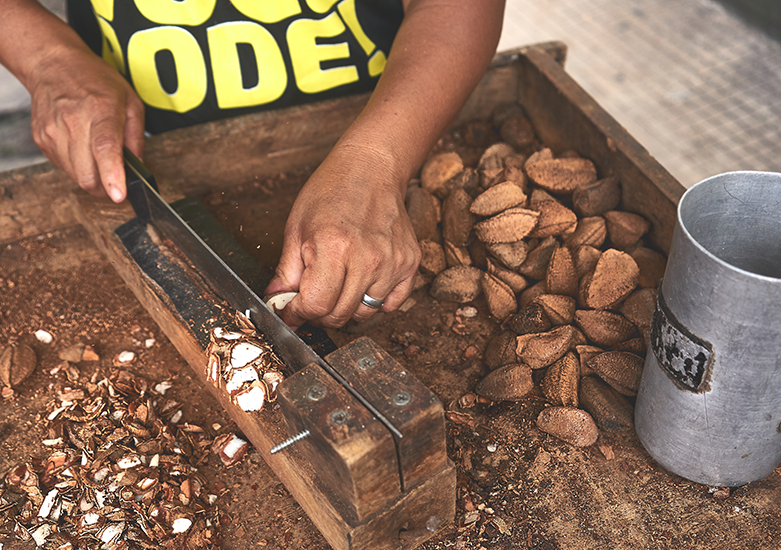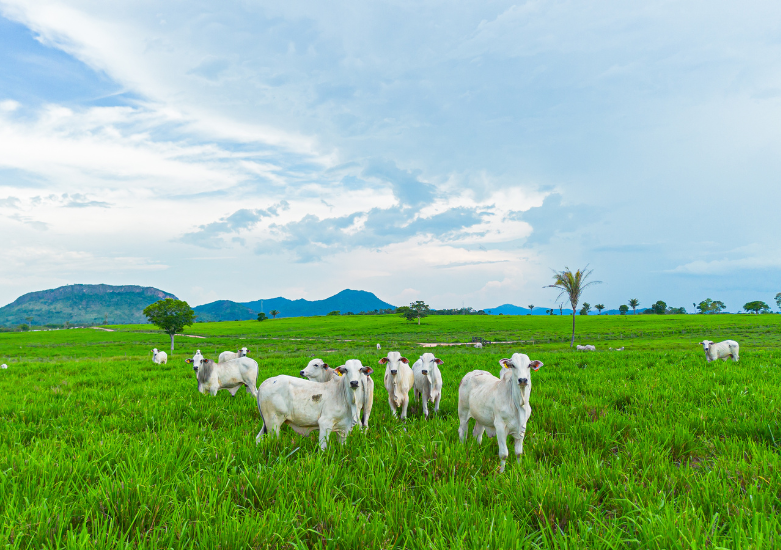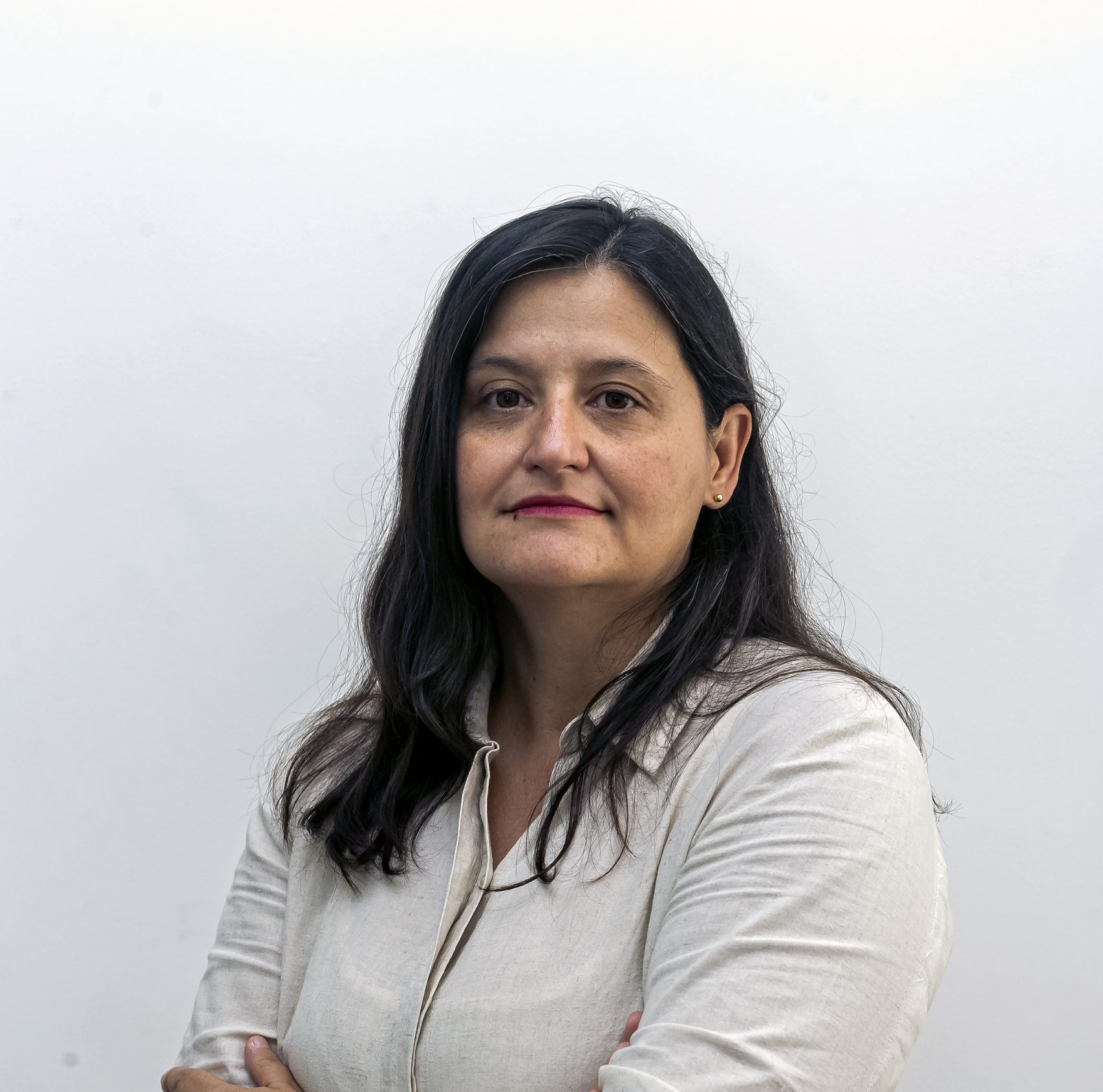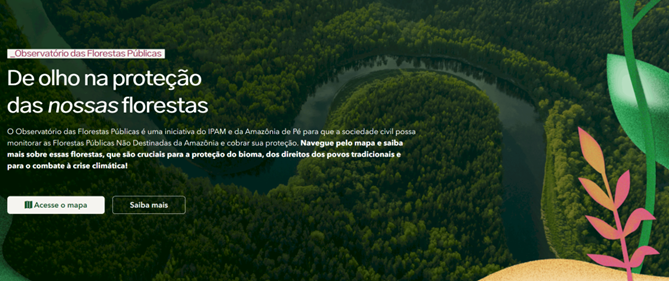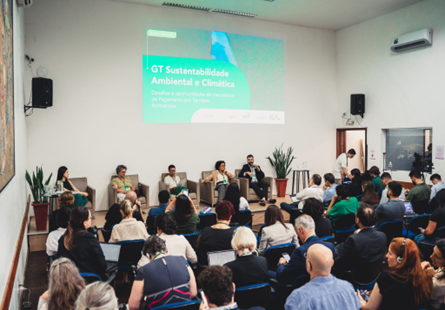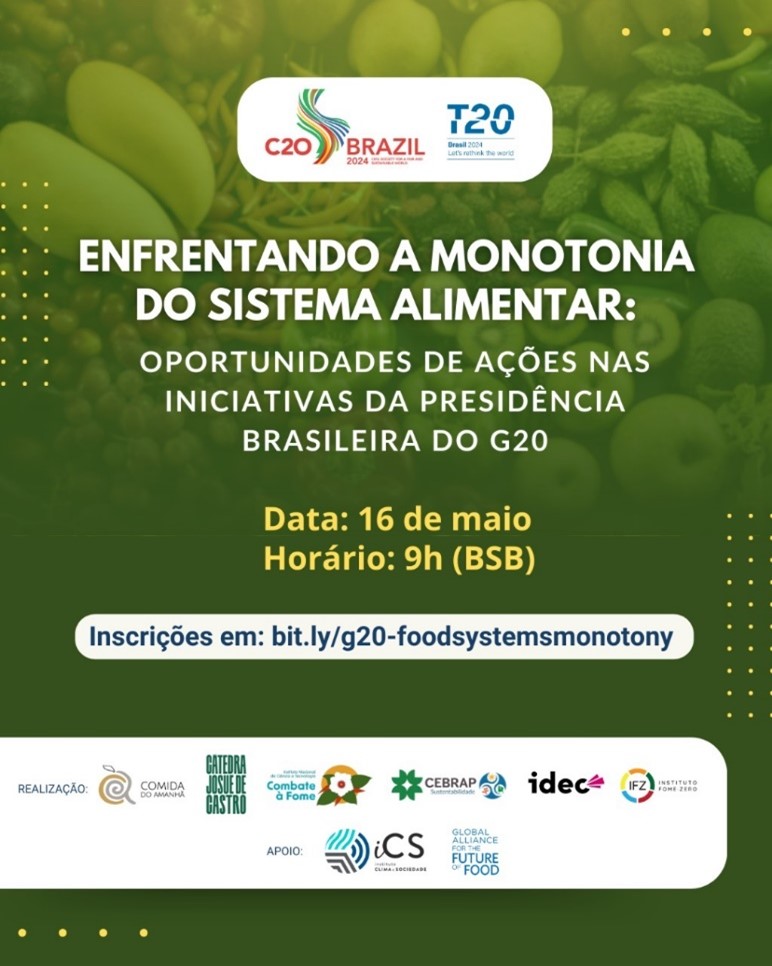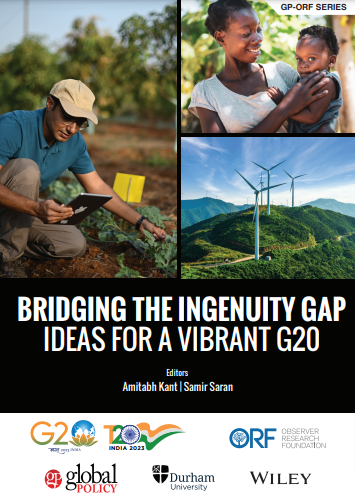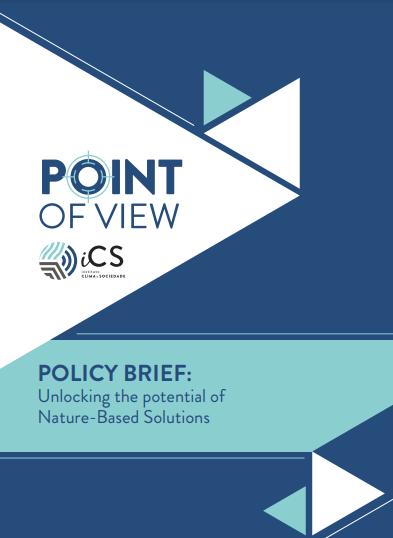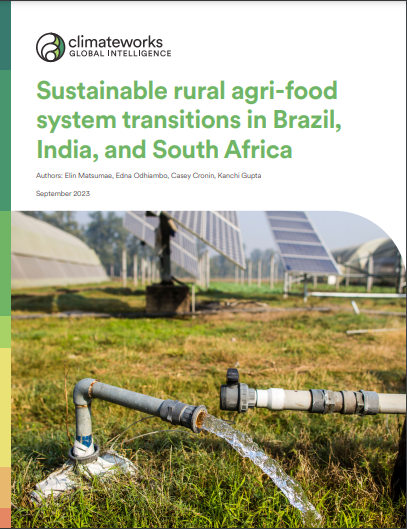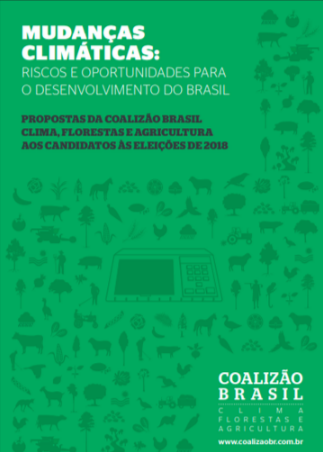|
SUSTENTAREA
|
|
2024 |
June |
12 months |
|
Redução de emissões de GEE no PNAE por meio de compras públicas sustentáveis | Núcleo de Pesquisa e Extensão da USP Sustentarea: To contribute to the National Fund for Education Development for incluiding climatic aspects in its national recommendations for the National School Feeding Program and encouraging public managers to follow them, as well as creating a tool that allows these managers to identify the origin of the meat purchased for school meals.
|
|
PUC ECONOMIA
|
|
2024 |
January |
10 months |
|
Amazonia 2030 Componente Instituto Itaúsa | PUC-Rio Dept.Economia: To contribute to the development of the Amazon through strategic studies, training and support for the implementation of economic solutions within the scope of public policies. At this stage, the Amazon 2030 project will work on the themes (i) carbon and forest restoration and (ii) the economy of cities in the Amazon. These strategic areas are added to the project’s previous deliveries.
|
|
REGENERA
|
|
2024 |
January |
12 months |
|
Da Amazônia Para Belém - COP 30 | Instituto Regenera: To expand the availability of agroecological food at COP 30, produced by local farmers and distributed through local producer networks. This will be pursued by strengthening local agroecological producer networks and collaborating with decision-makers at UNFCCC, federal, state, and municipal governments to meet the COP’s demand through these networks.
|
|
FINATEC
|
|
2024 |
June |
12 months |
|
Segurança Alimentar e Nutricional e justiça climática:evidências, políticas e ação. | Fundação de Empreendimentos Cientificos e Tecnologicos: Provide technical support for the development of the Sectoral Plan for Food and Nutritional Security Adaptation (SAN), as well as the guidelines for the Food and Climate Framework, in support of the Ministry of Social Development (MDS).
|
|
CCMob
|
|
2024 |
April |
12 months |
|
Estratégia de engajamento e Secretaria Executiva da Rede Brinco do Boi | Coalizão Clima e Mobilidade Ativa: To act as Executive Secretary of Brinco do Boi Network, a coalition aimed at conducting communication and mobilization campaigns for transparency regarding the origin of meat and the traceability of the beef chain. The Network will bring together civil society organizations, think tanks, communication organizations, among others, and will work on a positive agenda.
|
|
JOSUE DE CASTRO
|
|
2024 |
May |
18 months |
|
Consumo de proteína animal no Brasil no contexto das mudanças climáticas | Cátedra Josué de Castro: Investigate the meat consumption profile in Brazil and seek ways to diversify the demand and supply of alternatives to animal protein, as well as promote the debate on the contours of regenerative livestock (cattle, swine, and poultry).
|
|
MESA BR
|
|
2024 |
May |
12 months |
|
Diagnóstico da vinculação da GTA ao CAR e de incentivos para adoção da rastreabilidade pelos produtores | ASSOCIACAO CIVIL DA PECUARIA SUSTENTAVEL - GTPS - GRUPO DE TRABALHO DA PECUARIA SUSTENTAVEL: To contribute to the engagement of the livestock sector with the traceability of the cattle chain through the analysis of the impacts of the current integration of CAR (Rural Environmental Registry) and GTA (Guide for Transport of Animals) in Pará and the identification of incentives for the adoption of traceability by rural producers.
|
|
CPI
|
|
2024 |
March |
10 months |
|
Amazonia 2030 Componente Instituto Itaúsa | Climate Policy Initiative - Brasil: To contribute to the development of the Amazon region through strategic studies, training and support for economic solutions and public policies. In this phase, the Amazon 2030 project will work on the themes (i) overview of infrastructure projects in the Amazon and their socio-environmental impacts, (ii) deforestation in settlements and (iii) institutional arrangements for forest restoration.
|
|
FGV Agro
|
|
2024 |
May |
12 months |
|
Avaliação da Viabilidade, Incentivos Financeiros e Disseminação de Informações no Setor Agropecuário | Fundacao Getulio Vargas - Agro: Propose adjustments to rural credit and insurance aimed at adapting Brazilian agriculture to climate change (CC). The following will be done: analysis of impact scenarios of CC on second-crop corn until 2050; Analysis of the adherence of current credit mechanisms to the generated impacts and recommendations for improvement; and Communication actions of the results to the agricultural sector.
|
|
CEA
|
|
2024 |
January |
12 months |
|
Amazonia 2030 Componente Instituto Itaúsa | Centro de Empreendedorismo da Amazônia: Facing a perfect storm is the current situation in the Amazon, with a low productive and informal economy, gaps on social progress, conflicts and uncertainties about land rights. The Amazon 2030 will contribute with guidelines for the region’s development through research in three strategic areas of the forest-based economy: forest management, energy and social progress.
|
|
ISA
|
|
2024 |
June |
18 months |
|
Estruturação da cadeia produtiva de sementes nativas para dar escala à restauração de ecossistemas no Brasil | Instituto Socioambiental: To strengthen the native seed productive chain by supporting and fomenting the networks and groups of seed collectors through the Redario. Institutional, financial/commercial management and governance of native seed collectors networks strengthening actions as well as political and multisectoral coordination actions to strengthening the native seed and restoration chains will be carried out.
|
|
MPA
|
|
2023 |
September |
10 months |
|
Alimentar Cinco Milhões de Brasileiros e Brasileiras | Movimento dos Pequenos Agricultores: Create a network of grassroots organizations and movements that will work on the development of the ‘Feed Five Million Brazilians’ Plan. This plan will result in a proposal for designing a public policy that connects agroecological production from family farming to the supply of healthy and sustainable food in cities, especially for the most vulnerable.
|
|
IDESAM
|
|
2023 |
May |
6 months |
|
Mapeamento de projetos de carbono e sua relação com povos indígenas e comunidades tradicionais na Amazônia brasileira | Instituto Conservação e Desenv Sust da Amazônia: To assess the state of the art of forest carbon projects in Brazil and its methodological challenges to support proposals aiming to ensure integrity and safeguards. Quantitative and qualitative analyzes of projects in the Brazilian Amazon will be carried out, including regional mapping, using the databases of the main certifiers: VERRA/VCS, Gold Standard and Plan Vivo.
|
|
ANA
|
|
2023 |
September |
10 months |
|
XII Congresso Brasileiro de Agroecologia: estreitando os laços entre a agroecologia e a justiça climática | AS-PTA Assessoria e Serviços a Projetos em Agricultura Alternativa: To support the organization of the Climate Justice axis at the XII Agroecology Congress and the structuring of the National Agroecology Articulation’s position on the relationship between agroecology and climate change, bringing this network closer to the climate agenda
|
|
NUPENS / FUSP
|
|
2023 |
November |
12 months |
|
Transição Agroalimentar no debate do G20 | Núcleo de Pesq. Epidemiológicas em Nutrição e Saúde: To promote informed debate on the role of the G20 and international financing for the agri-food transition, through the organization of policy briefs and discussions with key stakeholders on the environmental impacts and food security implications of a production focus on commodities and the need for diversification in food production.
|
|
IMAZON
|
|
2023 |
October |
12 months |
|
Ampliando a efetividade de ações de responsabilização por desmatamento ilegal | Inst. do Homem e Meio Ambiente da Amaz.: To enhance the effectiveness of illegal deforestation accountability measures in the Amazon region, with a focus on the “Amazon Protects” program by the Federal Public Prosecutor’s Office. The project will assist in formulating concrete recommendations for the National Council of Justice to ensure the effective implementation of judgments for the recovery of illegally deforested areas.
|
|
ICV
|
|
2023 |
August |
15 months |
|
Monitor de Fiscalização - MapBiomas | Instituto Centro de Vida: To improve the monitoring of deforestation enforcement actions through a platform that track authorizations and inspection linked to deforestation alerts. The project will update current data (Ibama, ICMBio & 10 subnational agencies) and double the number of subnational agencies with data available, focusing on the Legal Amazon & MATOPIBA, in addition of improving automation and update frequency.
|
|
AMZ INVESTORS
|
|
2023 |
January |
12 months |
|
Alavancando investimento internacional para a bioeconomia e investimento de impacto na Amazônia | Amazon Investors Coalition: To educate international impact investors about the opportunities of the bioeconomy in the Amazon, helping to leverage impact investment and develop the impact entrepreneurship ecosystem in the Amazon. Streamline the financing ecosystem for the Amazonian bioeconomy by connecting the local ecosystem with international networks of impact investors.
|
|
CEBRAP
|
|
2023 |
September |
12 months |
|
Agenda setting para uma transição inclusiva dos sistemas agroalimentares no Brasil | Centro Brasileiro de Análise e Planejamento: Promoting high-level debate on the agri-food transition in Brazil, bringing as main inputs an analytical perspective on how the topic is being incorporated into the structures of the federal government, and the organization of a high-level multistakeholder group for this agenda setting.
|
|
IFZ
|
|
2023 |
June |
12 months |
|
Integração da política nacional de segurança alimentar com a política climática | Instituto Fome Zero: To advocate for the effectiveness of the National Policy on Agroecology and Organic Production (PNAPO) and its integration with the climate agenda, through the evaluation of its implementation status, mapping of the involved stakeholders, and the development of improvement recommendations to be addressed to the federal government, notably the Ministries of Social Development and Agrarian Develpt.
|
|
CEA
|
|
2023 |
October |
6 months |
|
Apoio ao aprimoramento dos sistemas PRODES e DETER Parte 2 (Complemento G-22-01193) | Centro de Empreendedorismo da Amazônia: To continue the improvement of PRODES and DETER systems, supporting the transition of INPE’s Amazon deforestation monitoring system based on visual interpretation of images by classification algorithms based on big data combined with further review by experts.
|
|
IPAM
|
|
2023 |
December |
12 months |
|
Quantificando danos climáticos: Análise da Aprovação do Marco Temporal e da Redução de RL em Roraima | Inst. de Pesquisa Ambiental da Amazônia: To analyse the climate impacts of legislative proposals currently in Congress that weaken the territorial rights of indigenous peoples, and changes in the forest legislation of Roraima. The project will also contribute to anti-deforestation efforts led by the Federal Public Ministry (MPF) and civil society organizations by quantifying the climate damages resulting from illegal deforestation.
|
|
DATA PRIVACY
|
|
2023 |
October |
10 months |
|
Regulação ambiental e democracia: Efetivando a LGPD para a divulgação de dados ambientais | Associação Data Privacy Brasil de Pesquisa: To conduct a legal study regarding the inadequate use of the Data Privacy Act, aiming to identify and clarify potential obstacles created in accessing environmental information, with emphasis on the Animal Transit Guide. Through the generation of knowledge and advocacy actions, the project will demonstrate the legal feasibility of sharing personal data in environmental policies.
|
|
MAPARAJUBA
|
|
2023 |
December |
12 months |
|
Assessoria jurídica popular para projetos de carbono em territórios tradicionais do tapajós | Associação Maparajuba Direitos Humanos: To enhance the training of community-based legal advisors for their involvement with indigenous peoples and traditional communities in the Tapajós region, Western Pará, with a focus on carbon credits and climate justice. The project will aid in organizing workshops for communities interested in this subject and in creating content related to contractual justice in carbon credit projects.
|
|
Lab OC
|
|
2023 |
January |
10 months |
|
Estimativa das emissões de GEE associadas aos sistemas alimentares | Lab. do Observatório do Clima: To estimate greenhouse gases emissions (GHG) from food systems in Brazil, detailed by the main sectors – land use change, agriculture, energy, industrial processes and residues. As much as possible, the project will also estimate GHG emission from the key food commodities chains, notably, meat.
|
![]()
